【精彩课堂】Unit4 Section A 1a-2c课件(新目标九年级Unit 4 I used to be afraid of the dark)
文档属性
| 名称 | 【精彩课堂】Unit4 Section A 1a-2c课件(新目标九年级Unit 4 I used to be afraid of the dark) | 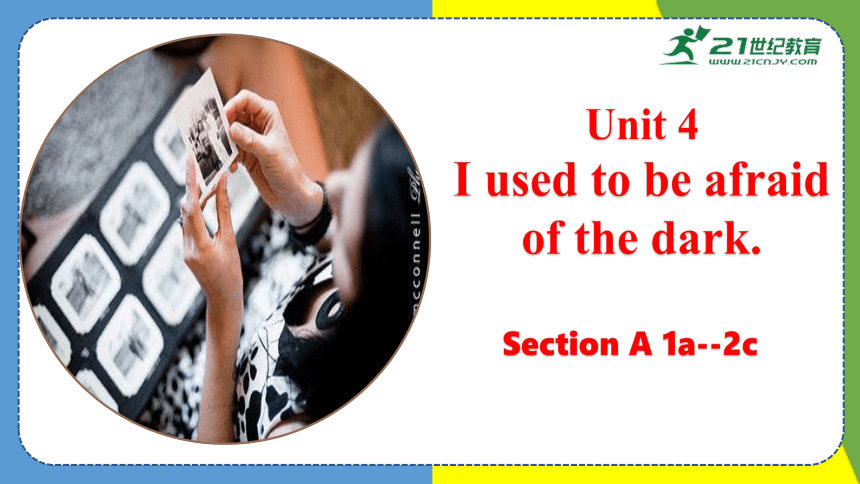 | |
| 格式 | zip | ||
| 文件大小 | 34.4MB | ||
| 资源类型 | 试卷 | ||
| 版本资源 | 人教新目标(Go for it)版 | ||
| 科目 | 英语 | ||
| 更新时间 | 2023-10-17 11:09:40 | ||
图片预览

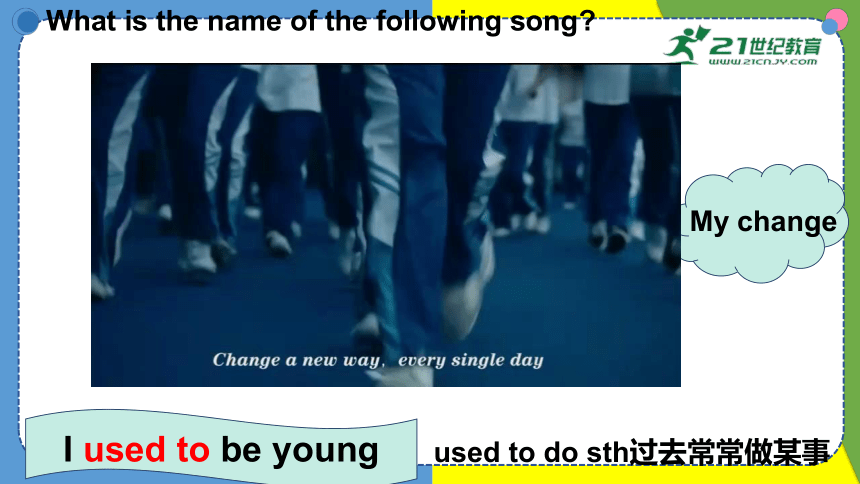

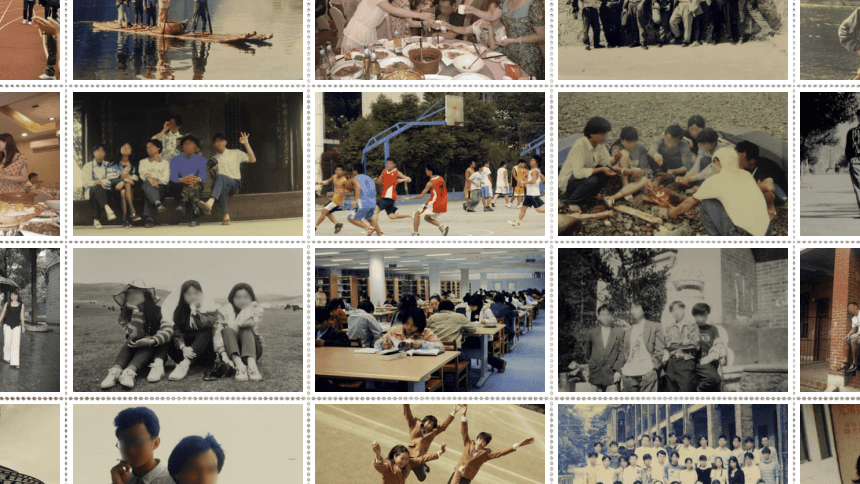
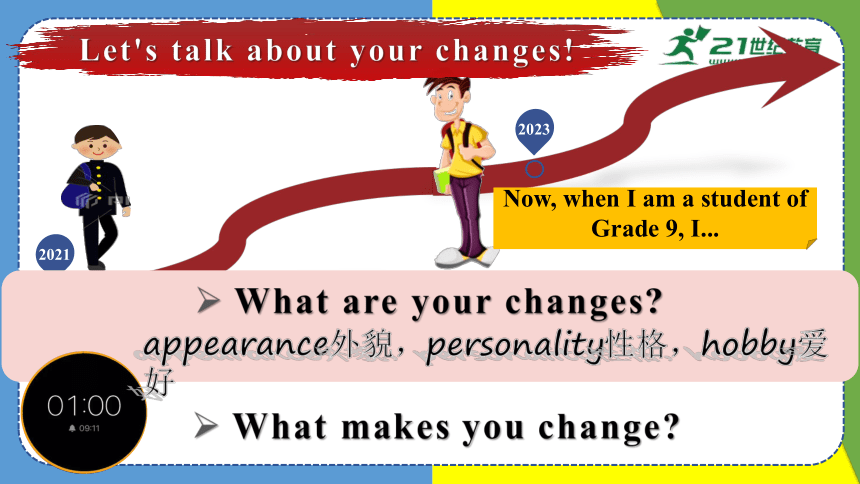
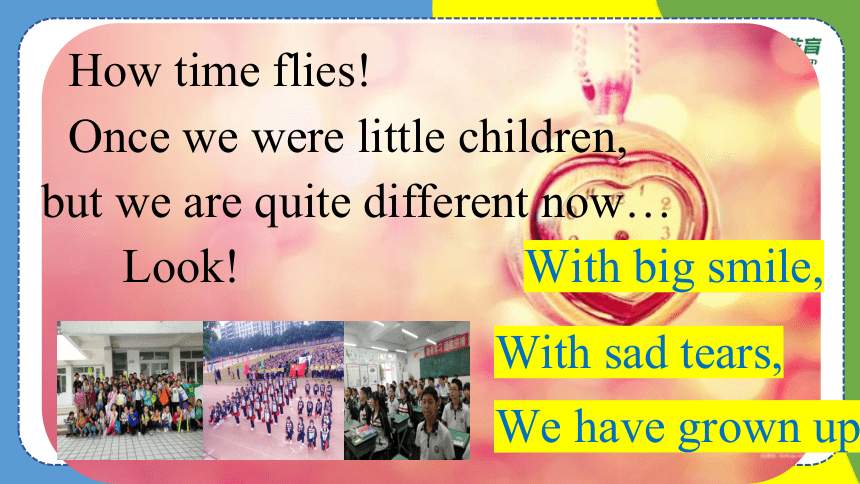
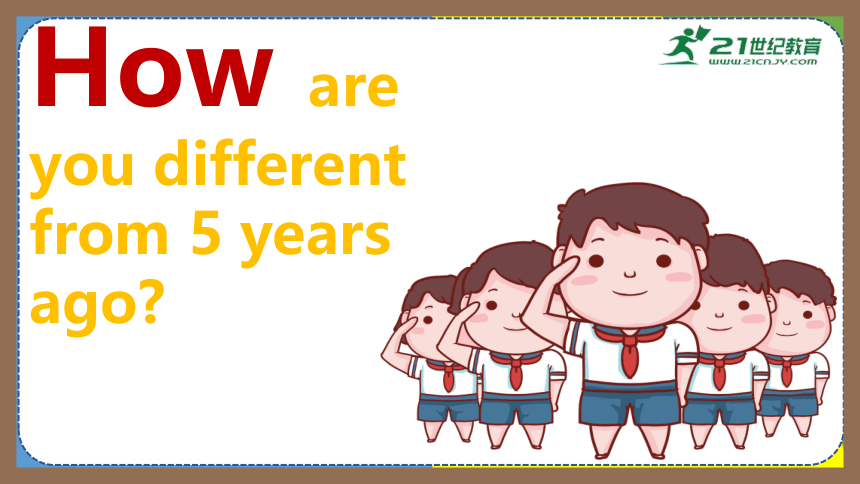
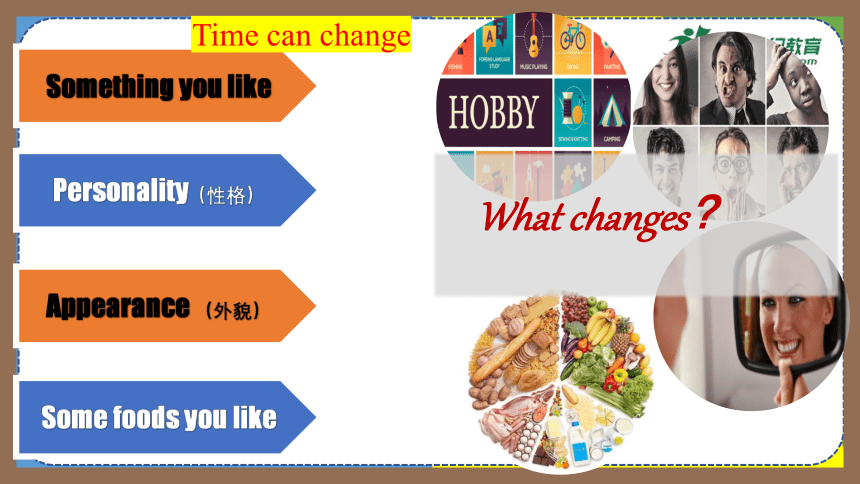
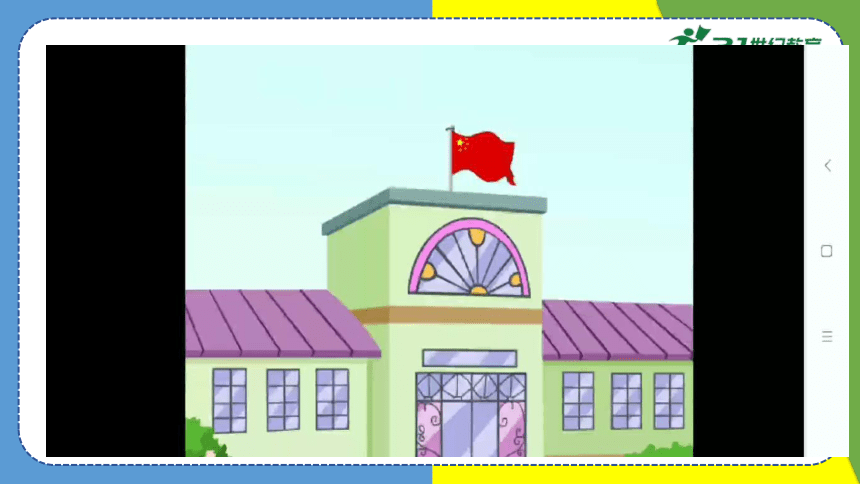
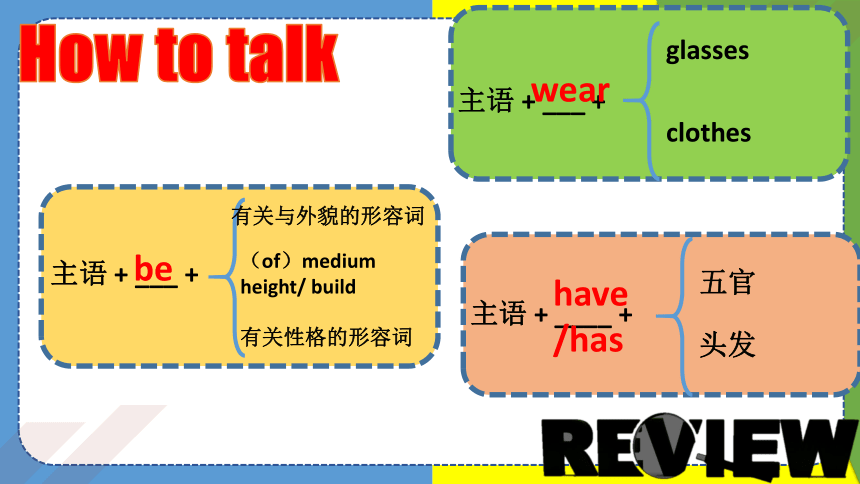
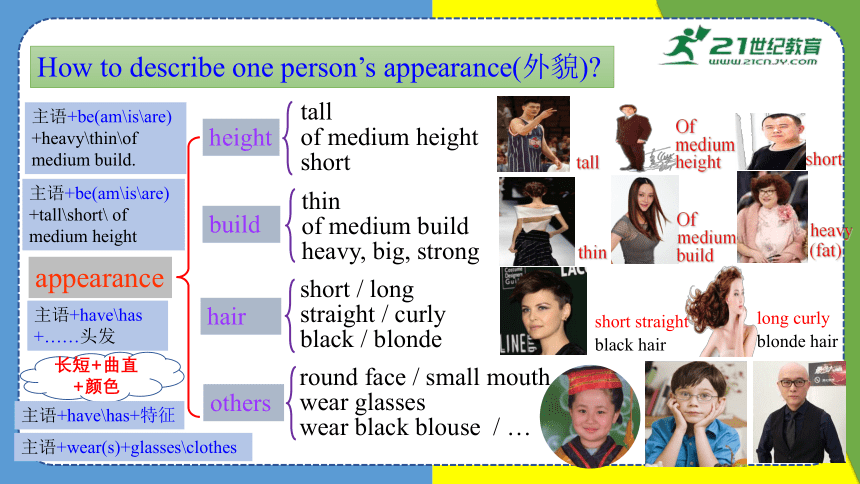
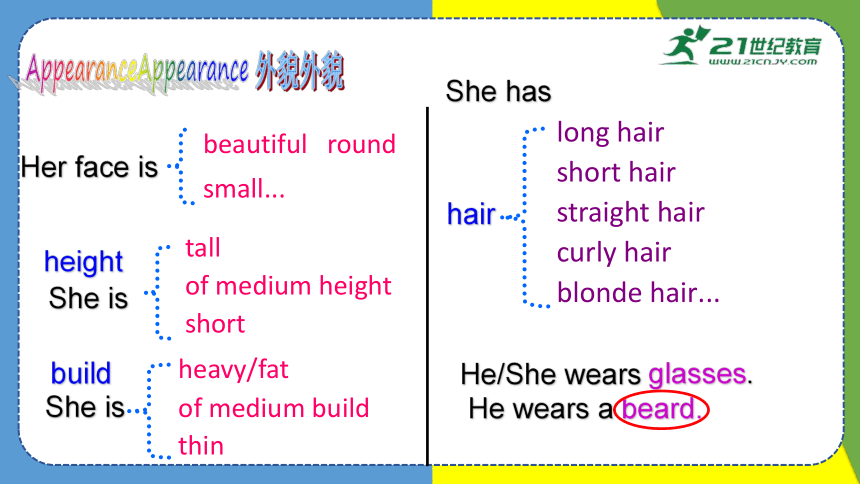
文档简介
(共54张PPT)
Unit 4
I used to be afraid of the dark.
Section A 1a--2c
What is the name of the following song
I used to be young
used to do sth过去常常做某事
My change
Now, when I am a student of Grade 9, I...
When I was a student of Grade 7, I ...
2021
2023
Let's talk about your changes!
What are your changes
What makes you change
appearance外貌,personality性格,hobby爱好
How time flies!
Once we were little children,
but we are quite different now…
Look!
With big smile,
With sad tears,
We have grown up…
How are you different from 5 years ago
Something you like
Personality(性格)
Appearance (外貌)
Some foods you like
What changes?
Time can change
How to talk
主语 + ___ +
有关与外貌的形容词
(of)medium height/ build
有关性格的形容词
be
主语 + ___ +
glasses
clothes
wear
主语 + ____ +
五官
头发
have/has
How to describe one person’s appearance(外貌)
appearance
height
tall
of medium height short
build
thin
of medium build heavy, big, strong
hair
short / long
straight / curly
black / blonde
主语+have\has +……头发
长短+曲直+颜色
主语+be(am\is\are) +heavy\thin\of medium build.
主语+be(am\is\are) +tall\short\ of medium height
others
tall
short
Of
medium
height
thin
Of
medium
build
heavy
(fat)
long curly
blonde hair
short straight
black hair
round face / small mouth
wear glasses
wear black blouse / …
主语+wear(s)+glasses\clothes
主语+have\has+特征
He/She wears glasses.
He wears a beard.
height
tall
of medium height
short
build
heavy/fat
of medium build
thin
AppearanceAppearance
beautiful round
small...
hair
long hair
short hair
straight hair
curly hair
blonde hair...
外貌外貌
Her face is
She is
She is
She has
Talk about personality(性格).
outgoing
外向的/好交际的
shy
怕羞的
funny
滑稽有趣的的
quiet
安静的
friendly
友好的
humorous
有幽默感的,滑稽有趣的
silent
不说话的,沉默的
helpful
有帮助的
Presentation
Practice
Pre-listening
Look and say.
What does Jin Xing look like
appearance(外貌)
She has a big mouth.
She has black and long hair.
She is of medium build.
She is of medium height.
personality(性格)
What is Jin Xing like
She is outgoing.
She is interesting.
She is humorous(幽默的).
She is friendly.
Fill in the chart with words to describe people.
Appearance Personality
tall \ outgoing
funny
straight\curly hair
short \long hair
glasses
quiet
shy
lazy
friendly\hard-working
heavy\thin
round face\big eyes
be
have
\has
wear
be
short
1a
He used to be short, but now he is tall.
He was short when he was a child, but he is tall now.
in the past
Change in appearance
now
She had short hair when she was a child,
but she has long hair now.
She used to have short hair, but now she has long hair.
now
in the past
He used to be short, but now he is tall.
He was short when he was a child, but he is tall now.
now
in the past
Change in appearanceChange in appearance
Presentation
Today we’ll talk about
what people used to be like.
She had short hair when she was a student,
but she has long hair now.
She used to have short hair, but now she has long hair.
He was shy when he was a child, but he is really outgoing now.
He used to be shy, but now he is outgoing.
Change in personalityChange in personality
Let’s make a comparison.
Mary used to be a ______ woman. But now she is beautiful and _____.
fat
thin
“used to do…” 过去常常做某事,用于过去的时态.
John used to be a ______ man. But now he is confident and ________.
shy
outgoing
当我们想表达“今昔对比”时,我们可以用“…used to… . But now ….”句型。
Talk about the famous people or your friends.
thin /heavy
friendly / serious
quiet / humorous
long hair/ short hair
A: Did Jia use to be thin.
B: Yes, she didn’t use to be heavy.
A: She used to have long hair.
B: That’s right. She didn’t use to have short hair.
Good
morning!
She used to be beautiful,
didn't she
No, she didn't.
Good
morning!
He used to be shy, didn't he
Yes, he did.
I used to be afraid of the dark. (我过去害怕黑暗)
“used to +动词原形”表过去的习惯或过去经常反复发生的动作或状态。
He used to like playing the piano. (变否定句)
He didn’t use to like playing the piano.
You used to play tennis. (变一般疑问句)
Did you use to play tennis
Yes, I did. / No, I didn’t.
Discovery
do a summary
sb. used to + be/do… “过去经常….”
sb. didn’t use to…
--Did sb. use to …
--Yes, sb. did. / No, sb. didn’t.
What did sb. use to do sth.
Using the sentences to make a
conversation.
I used to...,
but now I am ...
Did you use to ......
He / She used
to......,
didn't he/she
Listen. Bob is seeing some friends for the first time in four years. What did his friends use to look like
1. Mario used to be ______. He used to wear ________.
2. Amy used to be _____. She used to have _______ hair.
3. Tina used to have _____ and _____ hair.
short
glasses
tall
short
red
curly
Look at the picture carefully, and try to complete the sentences before listening.
Listen again and complete the exercise.
Conversation 1
Bob is here with his ______ and he hasn't seen Mario for ____ years.
Conversation 2
Amy used to be really tall because Bob was _____ in the past.
Conversation 3
Tina: Hiya, Bob.
Bob: Hi, Tina. You've changed, too.
Tina: Oh, yeah
Bob: ________________________
Tina: Yeah, _________________, didn't it
Bob: And _____________!
Tina: Yeah, ___________________.
parents
four
short
You have blonde hair!
it used to be red
it's straight
it used to be curly
Tapescripts
used to + 动词原形 “过去经常; 以前常常”
(表示过去的习惯性动作或经常性状态)
1c
Look at the picture in 1a and make conversations.
A: Did Mario use to be short
B: Yes, he did. He used to be really short.
A: What’s he like now
B: He’s tall now
A: Did Amy use to have short hair
B: Yes, she did. She used to have short hair.
A: What’s she like now
B: She has long hair now.
A: Did Tina use to have red and curly hair
B: Yes, she did. He used to red and curly hair.
A: What’s she like now
B: She has blonde hair now.
What is sb like 用于提问人的性格、品质等,也可用于提问人的相貌。
e.g. —What is she like
—She is quiet and a little shy.
Did he use to be thin
He _____ ____ _______thin, but now he is heavy.
He is heavy now.
Yes, he used to be thin .
What is he like now
Practice
Did he use to be short
Yes, he used to be short .
What is he like now
He is tall now.
He _____ _____ _____short, but now he is tall.
used to be
used to be
He _____ ___ _____outgoing, but now he is serious.
Did he use to be
outgoing
Yes, he used to be
outgoing .
What is he like now
He is serious.
past
now
Did he use to
play basketball
Yes, he used to
play basketball .
What does he like now
He like playing football
now.
He ____ ____ ____basketball, but now he likes playing football.
used to play
used to be
Read these words and pay attention to their meanings.
friendly outgoing serious humorous silent active brave quiet helpful
Jim is a very ________ guy and he often helps his neighbors.
Mr. Johnson is a very _________ teacher. I think I’ve never seen him smile.
His comedies make us laugh a lot. He is a very ___________ actor.
helpful
serious
humorous
Choose some words in the box and finish the sentences.
Listen and check (√) the words you hear.
___ friendly ___ outgoing ___ serious
___ humorous ___ silent ___ active
___ brave ___ quiet ___ helpful
Observe the form.
What do we know about Paula in the past and Paula now
Was she good at schoolwork in the past
Did she like music in the past
Does she often do any sports now
Has she said goodbye to music now
How do we know all these things
In the past now
1. Paula used to be really ___________. She was always silent in class. She wasn’t very_________. She was never brave enough to ask questions. 2. She got good grades in __________. She was also good in ____________. She used to play the ______________. 1. Now she’s more interested in
__________. She plays __________almost every day. She’s also on a _________team.
2. She still plays the
__________ from time to time.
Listen again and complete the chart about how Paula has changed.
quiet
outgoing
science
music
piano
sports
soccer
swim
piano
2b
adj+enough
on a ... team
in a ... group
=sometimes
=at times
Listen again and answer the questions.
1) What class were they
2) What was Paula never brave to do in class
3) What subjects was Paula good at
4) What is Paula interested in now
They were in the same science class.
She was never brave to ask questions to teachers.
Science and music.
Paula is more interested in sports now.
Paula used to be really quiet.
Make conversations about Paula using the information in 2b.
I know. She was always silent in class.
2c
She wasn’t very outgoing. She was never brave enough to ask questions.
But she was always friendly. She got good grades in exams. And she was really good in music class, too. She used to play the piano.
But now she is more interest in sports. She plays soccer almost every day. She still plays the piano from time to time.
I know, She’s so active now.
Make a survey in your class about who has changed most. Then make a report.
Past Now
Hair
Height
Build
Personality
Hobby
We found … has changed most. He / She used to …, but now he / she …
Give a report like this:
Hello, everyone. Tom is my friend . He used to be..., but now he is.... He used to have..., but now he has... He used to play / like..., but now he plays / likes...now. Lucy used to have…People sure change a lot.
Groupwork
People Sure Change!
Talk about how you have changed.
1. What did you use to look like
2. What did you use to be like
3. What did you use to like doing
Sample
I used to be short and thin, but now I am tall
and strong. I used to be shy and quiet, but now I
am outgoing. I used to like playing soccer, but now
I like basketball more.
Writing
China used to be poor and backward(落后).
Discussion
What did China use to be like
不忘初心 砥砺前行
1. I used to be afraid of the dark.
used to do sth. 过去常常做某事
*表示过去经常性或习惯性的动作或状态,暗指现在已经不存在了,强调过去与现在的对比。used to 后接动词原形。
*used to的否定形式有两种:
didn’t use to或usedn’t to。
Language points
*used to用于疑问句时,可借助助动词did,也可以将used
提到主语前。
Did you use to… 或者Used you to…
e.g. They used to be good friends. 他们过去是好朋友。 (暗示现在不是了)
Mrs. Brown didn’t use to / usedn’t to travel in summer.
布朗夫人过去夏天不旅游。
Did you use to / Used you to play the guitar 他过去弹吉他吗?
【拓展】几个易混结构的比较:
结构 意义 to的作用
used to do sth. 过去常常做某事 不定式符号
use ... to do sth. 用…做… be used to do sth. 被用来做… be used to doing sth. 习惯于做某事 介词
use ... to do sth.用……做……
e.g. They use the knife to cut meat.他们用刀切肉。
e.g. This kind of wood is used to make paper.
这种木头是被用来做纸的。
be used to do sth. 被用来做某事
be / get used to sth. / doing sth. 习惯于某事 / 做某事
e.g. Lucy has been used to (eating) Chinese food.
Lucy已经习惯(吃)中餐了。
I think you’ll get used to the climate soon.
我想不久你就会习惯这种气候的。
根据所给汉语提示完成英语句子。
1. My uncle __________________(以前是个司机), but now he is an actor.
2. Tom’s father ____________________(过去常常看书) after lunch.
3. Mary __________________(以前常常骑自行车) to work, but now she _________________(习惯步行) to work.
4. The pencil ______________(被用来书写).
used to be a driver
used to read (books)
used to ride a bike
is used to walking
is used to write
from time to time是一个固定短语,意为“间或;有时”,常在句中作状语。
e.g. Tom goes to visit his grandmother in the countryside from time to time. 汤姆时常去看望住在农村的奶奶。
2. She still plays the piano from time to time.
3. He studied hard and got good scores on his exams.
score n. 得分;进球
e.g. He got high scores in the examination.
考试中他得了高分。
4. This party is such a great idea!
He used to be so shy and quiet.
反义疑问句,构成:陈述句,简短问句(一般疑问句)?
特点一:“前肯后否”或“前否后肯”,
特点二:后句在时态、人称和数方面必须与前句保持一致。
①你是个医生,是吗? ②我们不能吃太多冰淇淋,对吗?
③他喜欢跳舞,对吗? ④你妈妈不擅长做饭,是吗?
注意:若陈述部分为否定句,Yes或No的意思与它们本身的词义相反。
反义问句要点三,前后谓语正相反;
附加问句not现,必须缩写是习惯;
最后一点应注意,问句主语代词填。
反义疑问句用法歌诀
3、Mario, you used to be short, didn’t you 马里奥,你过去很矮,对吗?
What is sb. like 意为“某人怎么样?”提问人的外貌,性格,品质。
e.g. —What’s Mike like
—He is direct.
【拓展】What does sb. look like 意为“某人长得怎么样?”用于提问
人的外貌。
e.g. —What dose Mike look like
—He has long hair.
4、 What’s he like now
You must:
1. Read the tape scripts of 1b & 2b and recite the conversation of 2d.
2. Preview 3a-3c.
If you can:
3. Make an English speech about changes of your family members in appearance, personality and hobbies.
Homework
Everyday is different
Everything is changing
Everyone is changing
Say goodbye to yesterday,
enjoying today,
expect for future!
Unit 4
I used to be afraid of the dark.
Section A 1a--2c
What is the name of the following song
I used to be young
used to do sth过去常常做某事
My change
Now, when I am a student of Grade 9, I...
When I was a student of Grade 7, I ...
2021
2023
Let's talk about your changes!
What are your changes
What makes you change
appearance外貌,personality性格,hobby爱好
How time flies!
Once we were little children,
but we are quite different now…
Look!
With big smile,
With sad tears,
We have grown up…
How are you different from 5 years ago
Something you like
Personality(性格)
Appearance (外貌)
Some foods you like
What changes?
Time can change
How to talk
主语 + ___ +
有关与外貌的形容词
(of)medium height/ build
有关性格的形容词
be
主语 + ___ +
glasses
clothes
wear
主语 + ____ +
五官
头发
have/has
How to describe one person’s appearance(外貌)
appearance
height
tall
of medium height short
build
thin
of medium build heavy, big, strong
hair
short / long
straight / curly
black / blonde
主语+have\has +……头发
长短+曲直+颜色
主语+be(am\is\are) +heavy\thin\of medium build.
主语+be(am\is\are) +tall\short\ of medium height
others
tall
short
Of
medium
height
thin
Of
medium
build
heavy
(fat)
long curly
blonde hair
short straight
black hair
round face / small mouth
wear glasses
wear black blouse / …
主语+wear(s)+glasses\clothes
主语+have\has+特征
He/She wears glasses.
He wears a beard.
height
tall
of medium height
short
build
heavy/fat
of medium build
thin
AppearanceAppearance
beautiful round
small...
hair
long hair
short hair
straight hair
curly hair
blonde hair...
外貌外貌
Her face is
She is
She is
She has
Talk about personality(性格).
outgoing
外向的/好交际的
shy
怕羞的
funny
滑稽有趣的的
quiet
安静的
friendly
友好的
humorous
有幽默感的,滑稽有趣的
silent
不说话的,沉默的
helpful
有帮助的
Presentation
Practice
Pre-listening
Look and say.
What does Jin Xing look like
appearance(外貌)
She has a big mouth.
She has black and long hair.
She is of medium build.
She is of medium height.
personality(性格)
What is Jin Xing like
She is outgoing.
She is interesting.
She is humorous(幽默的).
She is friendly.
Fill in the chart with words to describe people.
Appearance Personality
tall \ outgoing
funny
straight\curly hair
short \long hair
glasses
quiet
shy
lazy
friendly\hard-working
heavy\thin
round face\big eyes
be
have
\has
wear
be
short
1a
He used to be short, but now he is tall.
He was short when he was a child, but he is tall now.
in the past
Change in appearance
now
She had short hair when she was a child,
but she has long hair now.
She used to have short hair, but now she has long hair.
now
in the past
He used to be short, but now he is tall.
He was short when he was a child, but he is tall now.
now
in the past
Change in appearanceChange in appearance
Presentation
Today we’ll talk about
what people used to be like.
She had short hair when she was a student,
but she has long hair now.
She used to have short hair, but now she has long hair.
He was shy when he was a child, but he is really outgoing now.
He used to be shy, but now he is outgoing.
Change in personalityChange in personality
Let’s make a comparison.
Mary used to be a ______ woman. But now she is beautiful and _____.
fat
thin
“used to do…” 过去常常做某事,用于过去的时态.
John used to be a ______ man. But now he is confident and ________.
shy
outgoing
当我们想表达“今昔对比”时,我们可以用“…used to… . But now ….”句型。
Talk about the famous people or your friends.
thin /heavy
friendly / serious
quiet / humorous
long hair/ short hair
A: Did Jia use to be thin.
B: Yes, she didn’t use to be heavy.
A: She used to have long hair.
B: That’s right. She didn’t use to have short hair.
Good
morning!
She used to be beautiful,
didn't she
No, she didn't.
Good
morning!
He used to be shy, didn't he
Yes, he did.
I used to be afraid of the dark. (我过去害怕黑暗)
“used to +动词原形”表过去的习惯或过去经常反复发生的动作或状态。
He used to like playing the piano. (变否定句)
He didn’t use to like playing the piano.
You used to play tennis. (变一般疑问句)
Did you use to play tennis
Yes, I did. / No, I didn’t.
Discovery
do a summary
sb. used to + be/do… “过去经常….”
sb. didn’t use to…
--Did sb. use to …
--Yes, sb. did. / No, sb. didn’t.
What did sb. use to do sth.
Using the sentences to make a
conversation.
I used to...,
but now I am ...
Did you use to ......
He / She used
to......,
didn't he/she
Listen. Bob is seeing some friends for the first time in four years. What did his friends use to look like
1. Mario used to be ______. He used to wear ________.
2. Amy used to be _____. She used to have _______ hair.
3. Tina used to have _____ and _____ hair.
short
glasses
tall
short
red
curly
Look at the picture carefully, and try to complete the sentences before listening.
Listen again and complete the exercise.
Conversation 1
Bob is here with his ______ and he hasn't seen Mario for ____ years.
Conversation 2
Amy used to be really tall because Bob was _____ in the past.
Conversation 3
Tina: Hiya, Bob.
Bob: Hi, Tina. You've changed, too.
Tina: Oh, yeah
Bob: ________________________
Tina: Yeah, _________________, didn't it
Bob: And _____________!
Tina: Yeah, ___________________.
parents
four
short
You have blonde hair!
it used to be red
it's straight
it used to be curly
Tapescripts
used to + 动词原形 “过去经常; 以前常常”
(表示过去的习惯性动作或经常性状态)
1c
Look at the picture in 1a and make conversations.
A: Did Mario use to be short
B: Yes, he did. He used to be really short.
A: What’s he like now
B: He’s tall now
A: Did Amy use to have short hair
B: Yes, she did. She used to have short hair.
A: What’s she like now
B: She has long hair now.
A: Did Tina use to have red and curly hair
B: Yes, she did. He used to red and curly hair.
A: What’s she like now
B: She has blonde hair now.
What is sb like 用于提问人的性格、品质等,也可用于提问人的相貌。
e.g. —What is she like
—She is quiet and a little shy.
Did he use to be thin
He _____ ____ _______thin, but now he is heavy.
He is heavy now.
Yes, he used to be thin .
What is he like now
Practice
Did he use to be short
Yes, he used to be short .
What is he like now
He is tall now.
He _____ _____ _____short, but now he is tall.
used to be
used to be
He _____ ___ _____outgoing, but now he is serious.
Did he use to be
outgoing
Yes, he used to be
outgoing .
What is he like now
He is serious.
past
now
Did he use to
play basketball
Yes, he used to
play basketball .
What does he like now
He like playing football
now.
He ____ ____ ____basketball, but now he likes playing football.
used to play
used to be
Read these words and pay attention to their meanings.
friendly outgoing serious humorous silent active brave quiet helpful
Jim is a very ________ guy and he often helps his neighbors.
Mr. Johnson is a very _________ teacher. I think I’ve never seen him smile.
His comedies make us laugh a lot. He is a very ___________ actor.
helpful
serious
humorous
Choose some words in the box and finish the sentences.
Listen and check (√) the words you hear.
___ friendly ___ outgoing ___ serious
___ humorous ___ silent ___ active
___ brave ___ quiet ___ helpful
Observe the form.
What do we know about Paula in the past and Paula now
Was she good at schoolwork in the past
Did she like music in the past
Does she often do any sports now
Has she said goodbye to music now
How do we know all these things
In the past now
1. Paula used to be really ___________. She was always silent in class. She wasn’t very_________. She was never brave enough to ask questions. 2. She got good grades in __________. She was also good in ____________. She used to play the ______________. 1. Now she’s more interested in
__________. She plays __________almost every day. She’s also on a _________team.
2. She still plays the
__________ from time to time.
Listen again and complete the chart about how Paula has changed.
quiet
outgoing
science
music
piano
sports
soccer
swim
piano
2b
adj+enough
on a ... team
in a ... group
=sometimes
=at times
Listen again and answer the questions.
1) What class were they
2) What was Paula never brave to do in class
3) What subjects was Paula good at
4) What is Paula interested in now
They were in the same science class.
She was never brave to ask questions to teachers.
Science and music.
Paula is more interested in sports now.
Paula used to be really quiet.
Make conversations about Paula using the information in 2b.
I know. She was always silent in class.
2c
She wasn’t very outgoing. She was never brave enough to ask questions.
But she was always friendly. She got good grades in exams. And she was really good in music class, too. She used to play the piano.
But now she is more interest in sports. She plays soccer almost every day. She still plays the piano from time to time.
I know, She’s so active now.
Make a survey in your class about who has changed most. Then make a report.
Past Now
Hair
Height
Build
Personality
Hobby
We found … has changed most. He / She used to …, but now he / she …
Give a report like this:
Hello, everyone. Tom is my friend . He used to be..., but now he is.... He used to have..., but now he has... He used to play / like..., but now he plays / likes...now. Lucy used to have…People sure change a lot.
Groupwork
People Sure Change!
Talk about how you have changed.
1. What did you use to look like
2. What did you use to be like
3. What did you use to like doing
Sample
I used to be short and thin, but now I am tall
and strong. I used to be shy and quiet, but now I
am outgoing. I used to like playing soccer, but now
I like basketball more.
Writing
China used to be poor and backward(落后).
Discussion
What did China use to be like
不忘初心 砥砺前行
1. I used to be afraid of the dark.
used to do sth. 过去常常做某事
*表示过去经常性或习惯性的动作或状态,暗指现在已经不存在了,强调过去与现在的对比。used to 后接动词原形。
*used to的否定形式有两种:
didn’t use to或usedn’t to。
Language points
*used to用于疑问句时,可借助助动词did,也可以将used
提到主语前。
Did you use to… 或者Used you to…
e.g. They used to be good friends. 他们过去是好朋友。 (暗示现在不是了)
Mrs. Brown didn’t use to / usedn’t to travel in summer.
布朗夫人过去夏天不旅游。
Did you use to / Used you to play the guitar 他过去弹吉他吗?
【拓展】几个易混结构的比较:
结构 意义 to的作用
used to do sth. 过去常常做某事 不定式符号
use ... to do sth. 用…做… be used to do sth. 被用来做… be used to doing sth. 习惯于做某事 介词
use ... to do sth.用……做……
e.g. They use the knife to cut meat.他们用刀切肉。
e.g. This kind of wood is used to make paper.
这种木头是被用来做纸的。
be used to do sth. 被用来做某事
be / get used to sth. / doing sth. 习惯于某事 / 做某事
e.g. Lucy has been used to (eating) Chinese food.
Lucy已经习惯(吃)中餐了。
I think you’ll get used to the climate soon.
我想不久你就会习惯这种气候的。
根据所给汉语提示完成英语句子。
1. My uncle __________________(以前是个司机), but now he is an actor.
2. Tom’s father ____________________(过去常常看书) after lunch.
3. Mary __________________(以前常常骑自行车) to work, but now she _________________(习惯步行) to work.
4. The pencil ______________(被用来书写).
used to be a driver
used to read (books)
used to ride a bike
is used to walking
is used to write
from time to time是一个固定短语,意为“间或;有时”,常在句中作状语。
e.g. Tom goes to visit his grandmother in the countryside from time to time. 汤姆时常去看望住在农村的奶奶。
2. She still plays the piano from time to time.
3. He studied hard and got good scores on his exams.
score n. 得分;进球
e.g. He got high scores in the examination.
考试中他得了高分。
4. This party is such a great idea!
He used to be so shy and quiet.
反义疑问句,构成:陈述句,简短问句(一般疑问句)?
特点一:“前肯后否”或“前否后肯”,
特点二:后句在时态、人称和数方面必须与前句保持一致。
①你是个医生,是吗? ②我们不能吃太多冰淇淋,对吗?
③他喜欢跳舞,对吗? ④你妈妈不擅长做饭,是吗?
注意:若陈述部分为否定句,Yes或No的意思与它们本身的词义相反。
反义问句要点三,前后谓语正相反;
附加问句not现,必须缩写是习惯;
最后一点应注意,问句主语代词填。
反义疑问句用法歌诀
3、Mario, you used to be short, didn’t you 马里奥,你过去很矮,对吗?
What is sb. like 意为“某人怎么样?”提问人的外貌,性格,品质。
e.g. —What’s Mike like
—He is direct.
【拓展】What does sb. look like 意为“某人长得怎么样?”用于提问
人的外貌。
e.g. —What dose Mike look like
—He has long hair.
4、 What’s he like now
You must:
1. Read the tape scripts of 1b & 2b and recite the conversation of 2d.
2. Preview 3a-3c.
If you can:
3. Make an English speech about changes of your family members in appearance, personality and hobbies.
Homework
Everyday is different
Everything is changing
Everyone is changing
Say goodbye to yesterday,
enjoying today,
expect for future!
同课章节目录
- Unit 1 How can we become good learners.
- Section A
- Section B
- Unit 2 I think that mooncakes are delicious!
- Section A
- Section B
- Unit 3 Could you please tell me where the restroom
- Section A
- Section B
- Unit 4 I used to be afraid of the dark.
- Section A
- Section B
- Unit 5 What are the shirts made of?
- Section A
- Section B
- Review of Units 1-5
- Unit 6 When was it invented?
- Section A
- Section B
- Unit 7 Teenagers should be allowed to choose their
- Section A
- Section B
- Unit 8 It must belong to Carla.
- Section A
- Section B
- Unit 9 I like music that I can dance to.
- Section A
- Section B
- Unit 10 You're supposed to shake hands.
- Section A
- Section B
- Review of Units 6-10
- Unit 11 Sad movies make me cry.
- Section A
- Section B
- Unit 12 Life is full of the unexpected
- Section A
- Section B
- Unit 13 We're trying to save the earth!
- Section A
- Section B
- Unit 14 I remember meeting all of you in Grade 7.
- Section A
- Section B
- Review of Units 11-14
